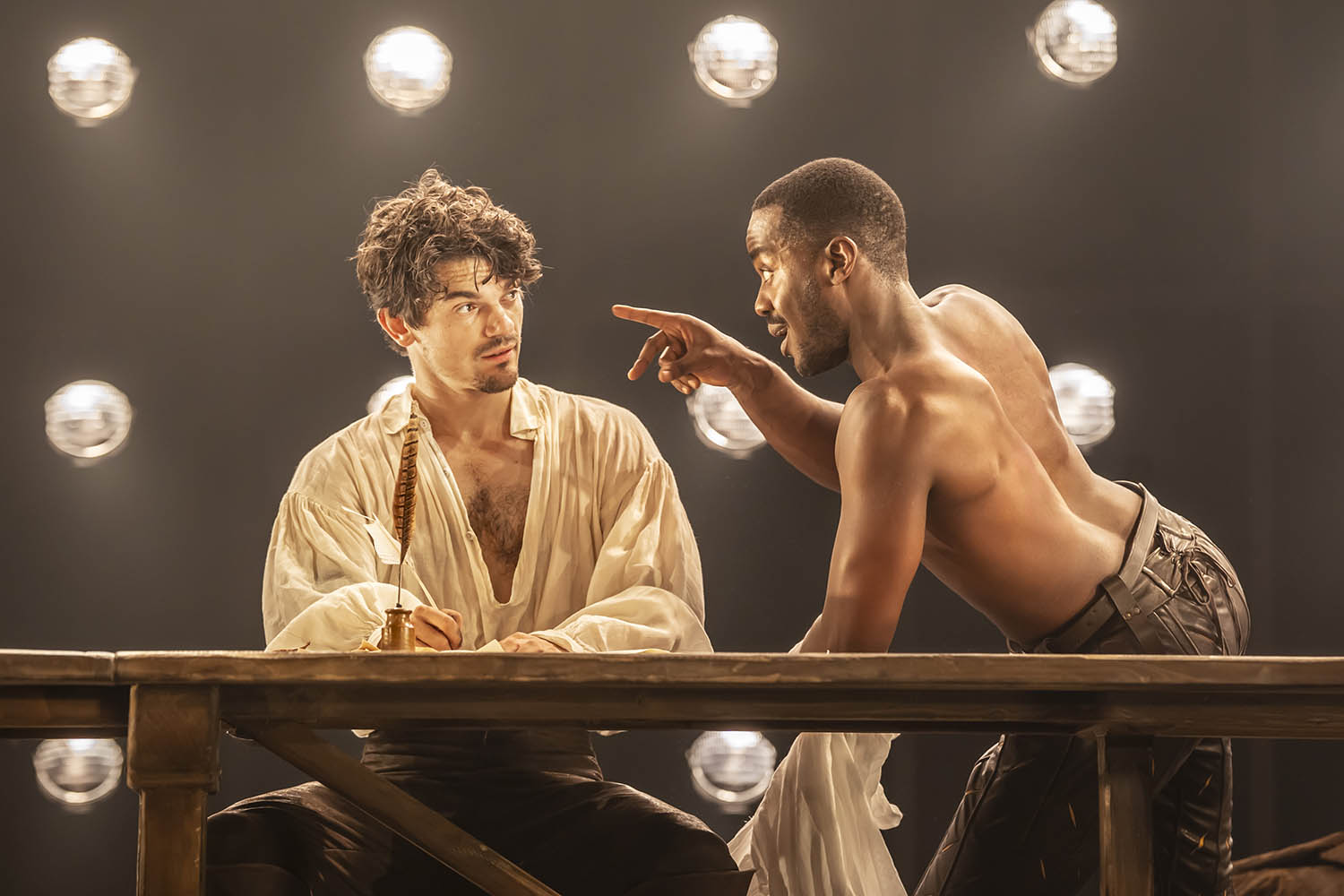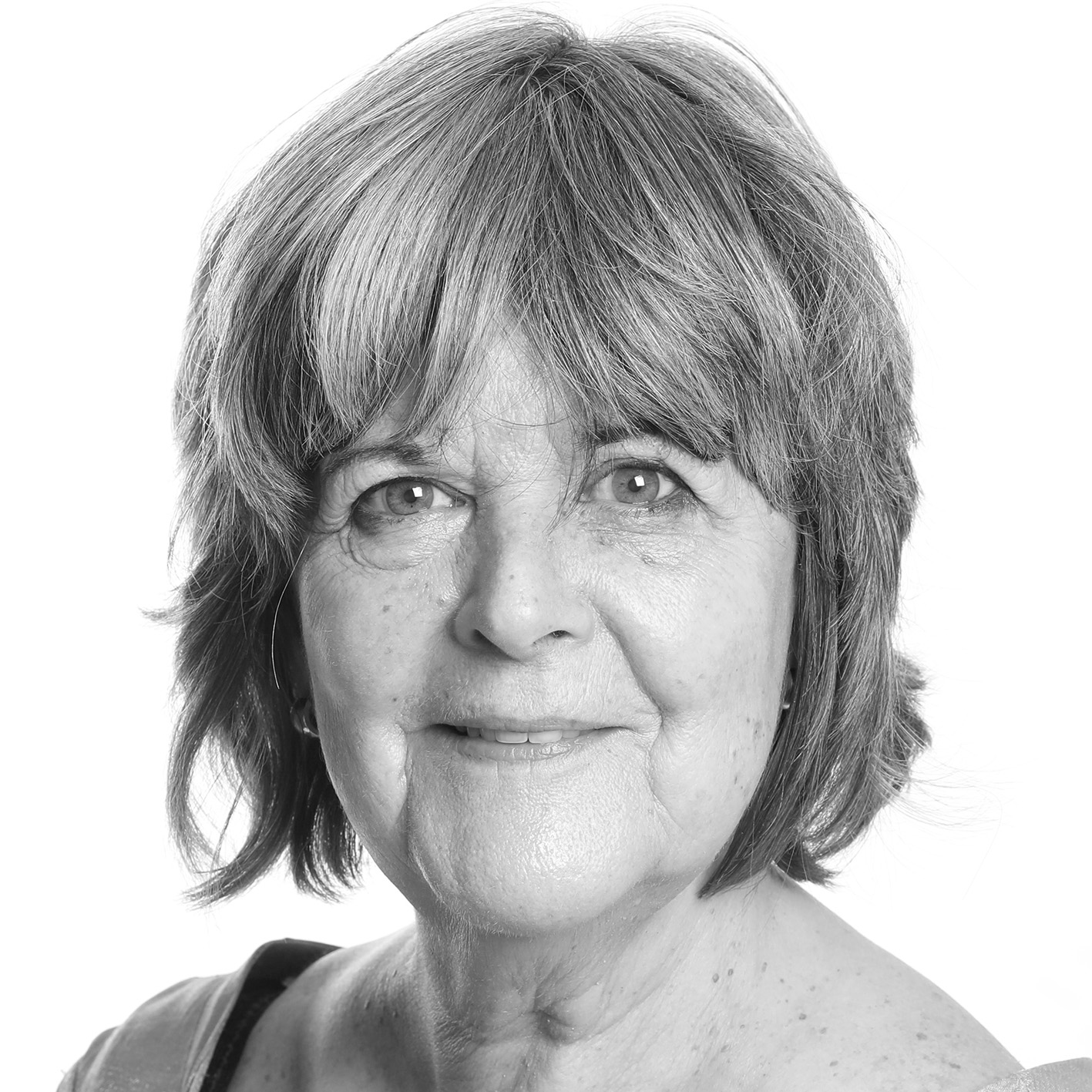What is the point of Christopher Marlowe? He used to be studied as if he were John the Baptist to Shakespeare’s Jesus, flagging up a new orthodoxy – blank verse! – yet wilder than his more revered contemporary, producing work of jagged brilliance, flashlit by gorgeous individual lines yet not fully rounded in human sympathy. The fame of his life has now almost overshadowed that of his plays and poems: he is celebrated for being a spy, for being stabbed to death in Deptford, for being gay.
Celebrity is scrawled all over Liz Duffy Adams’s hectic, scrappy play. In Born With Teeth the comparison with Shakespeare – the two playwrights were born in the same year – is not so much a link as a coupling. The two dramatists, presented as collaborating on the Henry VI trilogy, are more than dipping their quills in the same inkwell.
What quills! As Marlowe, Ncuti Gatwa sets an enormous plume quivering with caressing strokes. He is in – and also often partly out of – an ingenious leather version of doublet and hose. Shakespeare has a meeker costume and milder demeanour; Edward Bluemel, who appeared alongside Gatwa in Sex Education, is studious, restrained. Marlowe is the pursuer – trying to enlist his comrade as a spy but mainly rippling around looking for sex. He leaps, sprawls and cajoles; he is rivetingly physical.
Daniel Evans, co-artistic director of the RSC, who himself recently appeared in Marlowe’s Edward II, directs a production up to the brim with fervour. Joanna Scotcher’s design encloses the action in a black box studded with spotlights; this is a surveillance state: Scotcher also created the clever twisting-between-period costumes. Video of a frantic mouth – like that in Beckett’s Not I – opens the evening.
Newsletters
Choose the newsletters you want to receive
View more
For information about how The Observer protects your data, read our Privacy Policy
There is supposedly sweat of the brow as well as the loins. Though academic research has suggested Marlowe’s contribution to Henry VI, the writing scenes are the corniest parts of Born With Teeth. The two chaps excitedly scribble down good lines (they both want to claim the description of the infant Richard III that supplies the play’s title), toss off some Romeo and Juliet quotes, and produce heavy irony about their relative status: “You will never be anything but a minor talent,” Shakespeare is told.
Gatwa is not minor – but he is in danger of gorgeously repeating himself. Orchidaceous on stage in The Importance of Being Earnest, lolling on screen in The Roses. Next, why not prove himself in something buttoned-up? Caesar in Antony and Cleopatra?
“Kit” is remembered differently in his home city, where the gleaming theatre named after him has launched a production company to develop and tour new drama. Amy Rosenthal’s The Party Girls is Marlowe Theatre Productions’ promising first shot.
The title suggests Rosenthal’s punch with a pun. These are the Mitford sisters: drawlers and wits, flapping away in furs, while flirting with Hitler and American communists. Using their varied allegiances to investigate – lightly – the stain of antisemitism, Rosenthal makes Jessica, the civil rights campaigner and writer who scarpered from the stately home, her heroine.
Gatwa is in danger of gorgeously repeating himself. Next, why not prove himself in something buttoned-up?
Gatwa is in danger of gorgeously repeating himself. Next, why not prove himself in something buttoned-up?
The most incisive moments are not forthright denunciations. In a shrewd, painful scene, the rebel lefty (played with poise by Emma Noakes) confesses to her future husband how conscious she is that he is a Jew – and not upper class. Visiting Nancy, who is writing about Fred the Great to stave off the pain of Hodgkin lymphoma, Jessica goes on a shopping spree (probably not a very “U” term) with Diana. The sisters have been horrified by her “slacks” (the word slithers multisyllabically out of the Mitford mouth), “like a housewife advertising Kellogg’s”. Bullied into parading in a Chanel suit and apricot stilettos, Jessica pauses in front of the mirror (the audience, actually) as Diana slips her own necklace around her sister’s neck. She says she must send the clothes back, but her face suggests she is bewitched.
No one sister is sufficiently compelling to hold the action alone. Elisabeth Dermot Walsh glaciates persuasively as Diana; Kirsty Besterman’s Nancy intrigues; Ell Potter gives Unity, the Hitler adorer, the dim bounce of an Angela Brazil schoolgirl. Contrast makes them vivid. Richard Beecham’s production snaps between episodes, framed by neon in Simon Kenny’s sleek design.
I wish the soundtrack had made something of the future Duchess of Devonshire’s Elvis adoration. I wish, too, that the accents were spot-on: at the preview, the dialogue was so squeaky and so arbitrarily emphasised that individual words were smothered. The Mitford voice should sound completely artificial – yet not put on. That’s crucial. A hard task but as truly dramatic as Marlowe’s own bombast.
Photograph by Johan Persson

